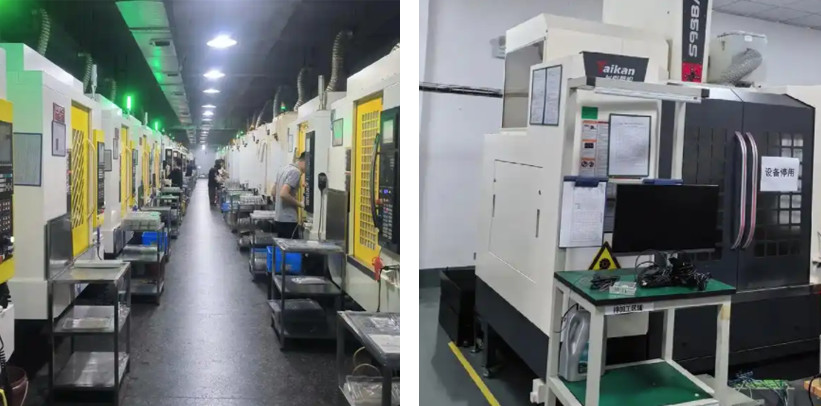CNC machining is a cornerstone of modern manufacturing, enabling the production of precise components for industries such as aerospace, automotive, medical, and electronics. Two primary types of facilities provide these services: CNC factories and CNC shops. While both utilize computer numerical control (CNC) technology for subtractive manufacturing, their equipment, capacity, and service offerings differ significantly. This article provides a detailed comparison to help manufacturers, engineers, and procurement professionals make informed decisions when selecting a machining partner. The focus is on equipment capabilities, production capacity, and service scope, presented with technical detail and clarity to establish trust and authority.
Defining CNC Factory and CNC Shop
A CNC factory is a large-scale manufacturing facility designed for high-volume production, often integrated into a broader production ecosystem. These facilities are typically part of a larger industrial operation, housing advanced machinery and automated systems to produce complex components at scale. CNC factories cater to industries requiring consistent output, such as automotive or aerospace, and often feature extensive infrastructure, including multiple CNC machines, quality control systems, and material storage.
In contrast, a CNC shop is a smaller, specialized facility focused on precision machining for low to medium volumes, including prototypes and custom parts. CNC shops are often standalone operations or part of a smaller manufacturing unit, emphasizing flexibility and personalized service. They cater to clients needing quick turnaround times or bespoke components, such as those in medical device prototyping or niche industrial applications.
The distinction lies in scale, specialization, and operational focus. CNC factories prioritize efficiency and volume, while CNC shops emphasize customization and agility. Understanding these differences is critical when evaluating their equipment, capacity, and service offerings.
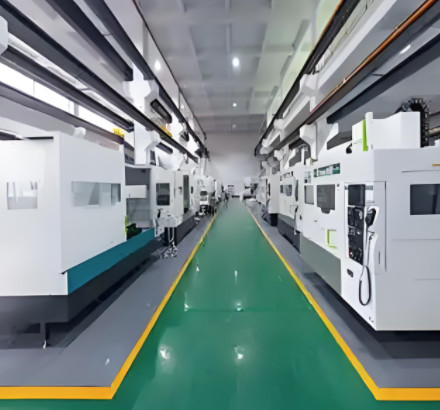
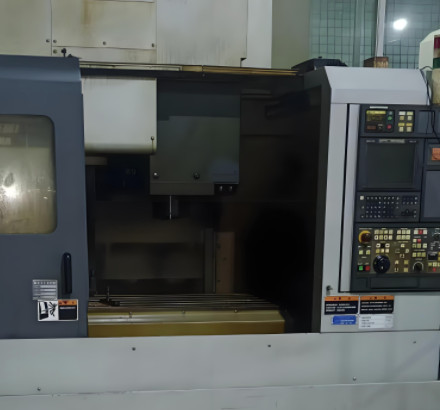
Equipment Comparison
The equipment in CNC factories and CNC shops determines their ability to handle specific projects. Both utilize CNC machines, such as mills, lathes, and routers, but the type, quantity, and sophistication of equipment vary significantly.
CNC Factory Equipment
CNC factories are equipped with a wide array of advanced machinery designed for high-throughput production. Common equipment includes:
- Multi-Axis CNC Mills: Factories often employ 4-axis and 5-axis vertical and horizontal machining centers (VMCs and HMCs). For example, machines like the Makino a51nx (4-axis HMC) or DMG Mori DMU 50 (5-axis VMC) offer spindle speeds up to 15,000 RPM and table sizes accommodating workpieces up to 630 mm x 630 mm.
- CNC Lathes: High-capacity lathes, such as the Okuma LB3000 EX II, feature live tooling and dual-axis capabilities, with chuck sizes ranging from 8 to 12 inches and maximum turning diameters of 410 mm.
- Large-Scale Gantry Mills: For oversized components, factories use gantry mills like the SNK HF-7VM, with table sizes up to 3,000 mm x 7,000 mm and load capacities of 100 tons.
- Electrical Discharge Machines (EDM): Wire and sinker EDMs, such as the Sodick AQ750L, enable intricate cuts in hardened materials with tolerances as tight as ±0.002 mm.
- Inspection Equipment: Coordinate Measuring Machines (CMMs) like the Zeiss Accura, with measurement ranges up to 1,200 mm x 1,800 mm x 1,000 mm, ensure precision for large production runs.
Factories also integrate automation systems, such as robotic arms and pallet changers, to enhance efficiency. For instance, a Fanuc M-710iC robot can handle material loading/unloading, reducing cycle times by up to 20%. These machines are maintained with rigorous calibration schedules to ensure consistent performance.
CNC Shop Equipment
CNC shops typically house a smaller, more versatile set of equipment suited for prototyping and custom orders. Common machines include:
- 3-Axis CNC Mills: Machines like the Haas VF-2, with a table size of 914 mm x 356 mm and spindle speeds up to 8,100 RPM, are ideal for small to medium parts with tolerances of ±0.005 mm.
- CNC Lathes: Compact lathes, such as the Hardinge Quest GT27, offer chuck sizes of 6 inches and maximum turning lengths of 400 mm, suitable for small-batch production.
- CNC Routers: Routers like the ShopSabre CNC 4896 handle materials like wood, composites, and plastics, with work areas up to 2,438 mm x 1,219 mm.
- Manual and Hybrid Machines: Some shops use manual mills or hybrid CNC/manual machines for one-off parts, offering flexibility for custom projects.
- Basic Inspection Tools: Shops rely on calipers, micrometers, and smaller CMMs, such as the Mitutoyo Crysta-Apex S, with measurement ranges up to 700 mm x 700 mm x 600 mm.
CNC shops may lack the automation systems found in factories, but they often include secondary equipment like bands saws (e.g., Amada HFA250W, with a cutting capacity of 250 mm x 250 mm) for pre-machining material preparation. Their equipment prioritizes versatility over high-volume throughput.
Production Capacity Comparison
Production capacity is a key differentiator between CNC factories and shops, influencing their ability to meet project demands in terms of volume, speed, and scalability.
CNC Factory Capacity
CNC factories are designed for high-volume production, often handling orders ranging from 1,000 to 100,000 parts. Their capacity is supported by:
- Large Machine Fleets: Factories may house dozens of CNC machines, enabling parallel processing. For example, a factory with 10 5-axis mills can produce 500 complex aerospace components per week.
- Automation and Shift Operations: Automated systems and 24/7 operations minimize downtime. A factory using pallet changers can achieve up to 85% machine utilization.
- Material Storage: Factories maintain extensive raw material inventories (e.g., aluminum, stainless steel, titanium) in on-site warehouses, reducing lead times for large orders.
- Scalability: Factories can scale production by adding shifts or machines. For instance, a facility with a Kiwa KH-4500kai HMC (8-pallet pool) can increase output by 30% with minimal setup changes.
A typical CNC factory can deliver lead times of 2-4 weeks for high-volume orders, with tolerances as tight as ±0.001 mm for precision industries like aerospace.
CNC Shop Capacity
CNC shops focus on low to medium volumes, typically handling 1 to 1,000 parts per order. Their capacity characteristics include:
- Smaller Machine Fleets: Shops may have 3-5 CNC machines, limiting simultaneous production but allowing for rapid setup changes.
- Manual Operations: Many shops rely on skilled machinists for setup and operation, which can extend lead times to 1-3 weeks for complex parts.
- Limited Material Stock: Shops often order materials per project, which may add 3-5 days to lead times for non-standard alloys or plastics.
- Flexibility: Shops excel at quick-turn prototyping, with some delivering parts in as little as 1-2 days for simple designs.
Shops are ideal for projects requiring rapid iteration, such as прототипирование a medical device component, but may struggle with high-volume orders due to limited machine availability.
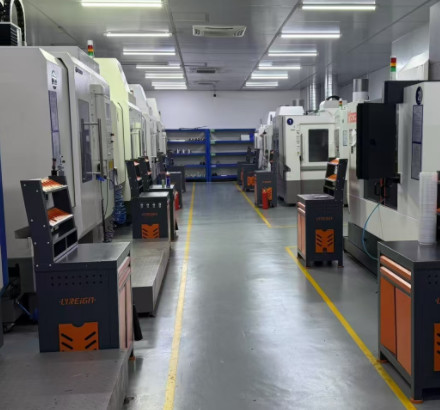
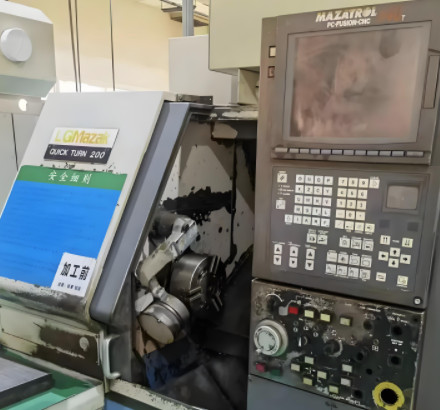
Service Offerings Comparison
The services provided by CNC factories and shops reflect their operational focus, with factories emphasizing comprehensive solutions and shops prioritizing customization.
CNC Factory Services
CNC factories offer a broad range of services tailored to large-scale production and complex projects. These include:
- Full-Scale Production: Factories handle end-to-end manufacturing, from material sourcing to final assembly, for industries like automotive and defense.
- Advanced Post-Processing: Services like anodizing, powder coating, and heat treatment are often in-house, ensuring seamless workflows. For example, Type II anodizing (MIL-A-8625) provides corrosion-resistant finishes for aluminum parts.
- Quality Assurance: Factories employ robust quality management systems (QMS), such as ISO 9001 or AS9100, with in-house CMMs and optical comparators for 100% inspection of critical parts.
- Engineering Support: Many factories offer design-for-manufacturability (DFM) feedback, using software like Mastercam to optimize toolpaths and reduce costs.
- Logistics and Stocking: Just-in-time (JIT) delivery and stocking programs ensure parts are available on demand, minimizing client inventory costs.
Factories are suited for clients needing consistent quality and volume, such as producing 10,000 titanium aerospace fasteners monthly.
CNC Shop Services
CNC shops focus on flexibility and rapid response, offering services tailored to custom and low-volume needs:
- Prototyping: Shops excel at producing one-off or small-batch parts, such as a single PMMA medical prototype with a surface finish of 32 µin Ra.
- Индивидуальная обработка: Shops accommodate unique designs, using materials like PEEK or Inconel for specialized applications.
- Basic Post-Processing: Services like polishing, bead blasting, or painting are common, though advanced finishes may be outsourced.
- Personalized Service: Shops often provide direct communication with machinists, allowing for rapid design iterations and feedback.
- Reverse Engineering: Using 3D scanners, shops can replicate existing parts without CAD models, ideal for legacy components.
Shops are ideal for startups or engineers needing quick prototypes or small runs, such as 50 custom brass fittings for a robotics project.
Key Considerations for Selection
Choosing between a CNC factory and a CNC shop depends on project requirements. The following table summarizes key differences to guide decision-making:
| Аспект | CNC Factory | CNC Shop |
|---|---|---|
| Объем производства | High (1,000–100,000 parts) | Low to Medium (1–1,000 parts) |
| Оборудование | 4/5-axis mills, large gantry mills, EDM, automated systems | 3-axis mills, compact lathes, routers, manual/hybrid machines |
| Время выполнения | 2–4 weeks for large orders | 1–3 weeks, as fast as 1–2 days for prototypes |
| Услуги | Full-scale production, advanced post-processing, DFM, JIT delivery | Prototyping, custom machining, basic post-processing, reverse engineering |
| Industries Served | Aerospace, automotive, defense, electronics | Medical, robotics, niche industrial, prototyping |
When selecting a provider, consider the following:
- Project Volume: Choose a factory for high-volume production and a shop for prototypes or small batches.
- Complexity: Factories handle complex geometries with multi-axis machines, while shops are better for simpler, custom parts.
- Lead Time: Shops offer faster turnaround for urgent projects, while factories provide efficiency for large orders.
- Quality Requirements: Factories are ideal for industries with strict standards (e.g., AS9100), while shops suit less regulated applications.
Заключение
CNC factories and CNC shops serve distinct roles in the manufacturing landscape, each excelling in specific areas. Factories are equipped for high-volume production with advanced machinery and comprehensive services, making them ideal for large-scale, precision-driven projects. CNC shops, with their versatile equipment and focus on customization, cater to prototyping and small-batch needs with agility. By understanding their differences in equipment, capacity, and services, businesses can select the right partner to meet their manufacturing goals efficiently and reliably.
CNC Factory vs CNC Shop: Frequently Asked Questions
What is the main difference between a CNC factory and a CNC shop?
The primary distinction lies in scale and focus:
CNC factories are large-scale facilities designed for high-volume production (1,000–100,000+ parts), using advanced multi-axis machines, automation, and integrated services for industries like aerospace and automotive.
CNC shops are smaller, specialized facilities that prioritize low to medium-volume production (1–1,000 parts), prototyping, and custom solutions for niche applications like medical devices or robotics.
When should I choose a CNC factory over a shop?
Choose a factory if you need:
High-volume production (1,000+ parts) with consistent quality.
Complex components requiring multi-axis machining (e.g., aerospace parts).
Integrated services like heat treatment or large-scale material storage.
Strict regulatory compliance (e.g., AS9100 for aerospace).
Can CNC shops handle complex parts with tight tolerances?
While shops can machine parts with tolerances up to ±0.005 mm, factories are better for extremely tight tolerances (e.g., ±0.001 mm) using advanced 5-axis machines and automated quality control. Shops may struggle with consistency in high-volume, precision-driven projects.
How do lead times and costs compare?
Lead times: Shops are faster for small orders (1–3 weeks), while factories may take longer for setup but are efficient for large batches (2–4 weeks).
Costs: Shops often have lower setup costs for small runs, but factories offer better per-unit costs for high volumes due to economies of scale.
What quality standards do CNC factories adhere to?
Many factories hold certifications like ISO 9001 (general quality) or AS9100 (aerospace), with in-house CMMs and 100% inspection for critical parts. Shops may have basic quality checks but lack the rigorous systems of factories.
